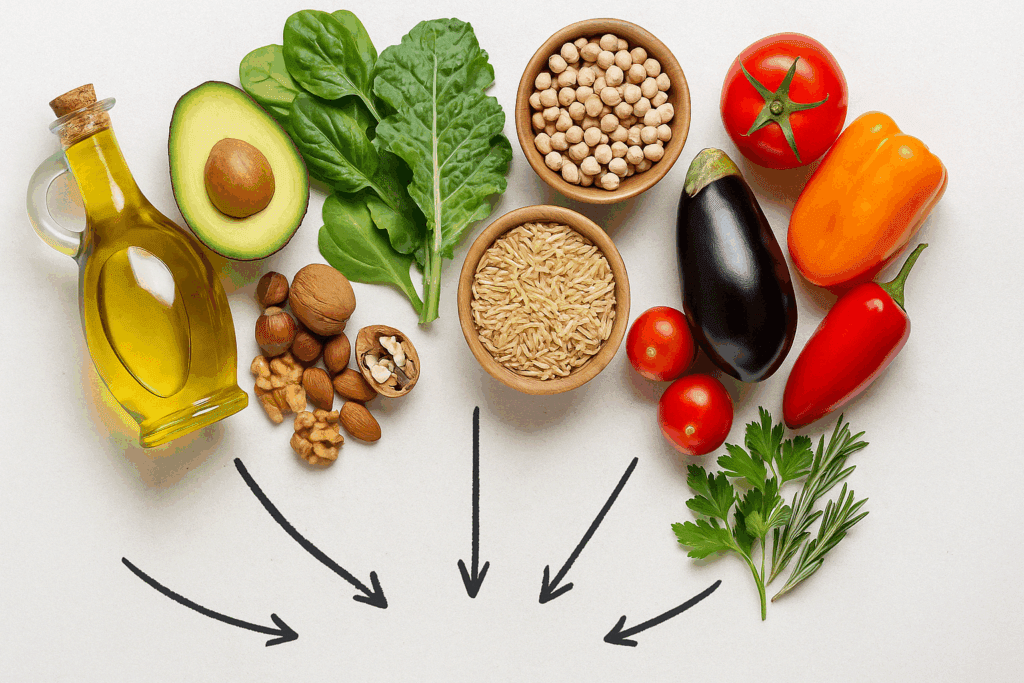In an age overrun by diet fads and fleeting nutrition trends, the Mediterranean ritual for weight loss has emerged not as a novelty but as a revival of ancestral wisdom validated by contemporary science. Rooted in centuries-old culinary traditions and complemented by modern research, this holistic lifestyle has drawn attention for its potential to promote sustainable weight management, cardiovascular health, and overall well-being. But what is the Mediterranean ritual for weight loss, exactly? How does the Mediterranean ritual diet plan differ from conventional weight-loss strategies, and what do Medi Eats diet reviews reveal about its commercial adaptations? This in-depth exploration answers these questions and more, offering a thorough, evidence-based guide tailored for a well-educated, health-conscious readership.
You may also like: Plant Based Diet vs Standard American Diet: What the Latest Studies Reveal About Long-Term Health Outcomes
Understanding the Mediterranean Ritual Diet Plan
The Mediterranean ritual diet plan is far more than a menu or calorie-counting regimen. It is a framework for living that prioritizes quality over quantity, social connection over isolation, and enjoyment over deprivation. Inspired by the dietary habits of communities along the Mediterranean coast—from Greece and southern Italy to parts of North Africa and the Levant—the diet emphasizes whole, minimally processed plant-based foods. Central to this lifestyle are vegetables, fruits, legumes, nuts, seeds, whole grains, and heart-healthy fats, particularly extra-virgin olive oil.
A distinguishing feature of the Mediterranean ritual diet plan is its flexible, inclusive structure. While animal products are not excluded entirely, they are consumed sparingly, with red meat limited and fish, dairy, and eggs used in moderation. The inclusion of these components aligns with the dietary patterns observed in traditional Mediterranean societies where chronic disease rates were historically low. Moreover, the diet encourages a mindful, unhurried approach to eating—often in the company of others—which promotes satisfaction and reduces the tendency to overconsume.
What sets this ritual apart is not only the food itself but how it is consumed. Meals are viewed as communal and meaningful, and physical activity is integrated into daily life through walking, gardening, and natural movement. This context of lifestyle integration distinguishes the Mediterranean ritual for weight loss from more reductionist programs focused solely on food restriction.

Scientific Foundations Behind the Mediterranean Weight Loss Approach
Mounting evidence from clinical trials and epidemiological studies supports the Mediterranean diet’s role in promoting weight loss and metabolic health. Unlike many restrictive diets that eliminate entire food groups or rely on meal replacements, the Mediterranean ritual works through natural mechanisms. Nutrient-dense, high-fiber foods promote satiety, reduce insulin spikes, and support the gut microbiome—all of which play key roles in healthy body weight regulation.
Notably, the landmark PREDIMED trial demonstrated that individuals following a Mediterranean-style diet enriched with olive oil or nuts experienced significant reductions in cardiovascular events and weight gain compared to those on low-fat diets. These findings challenge the outdated notion that dietary fat is inherently detrimental to weight control. On the contrary, unsaturated fats in olive oil, avocados, and fatty fish support hormonal balance and enhance nutrient absorption.
Furthermore, polyphenols from herbs, spices, and colorful produce possess anti-inflammatory properties that may enhance metabolic efficiency. Unlike ketogenic regimens, which suppress carbohydrate intake to induce a state of ketosis, the Mediterranean approach includes whole-food carbohydrates like legumes and whole grains that nourish the body without spiking blood sugar. This distinction underscores the divergence in long-term feasibility between the Mediterranean ritual and restrictive programs like keto.
Disentangling the Confusion: Is Keto a Low Carb Diet or a Restrictive Regimen?
In today’s saturated nutrition landscape, many people ask: is keto a low carb diet or a more extreme dietary intervention? The answer is nuanced. While all ketogenic diets fall under the broader umbrella of low carbohydrate diets, not all low carb approaches are ketogenic. A ketogenic diet typically restricts carb intake to below 50 grams per day—a level low enough to trigger ketosis, wherein the body shifts from burning glucose to metabolizing fat for energy.
This drastic shift produces short-term weight loss, especially in individuals with insulin resistance. However, the sustainability of this model remains in question. Is a keto diet sustainable over time? For many, the answer is no. The rigid carbohydrate limits, social eating restrictions, and potential nutrient deficiencies make it difficult to adhere to long-term.
By contrast, the Mediterranean ritual diet plan allows for a more balanced intake of carbohydrates, prioritizing complex sources that provide fiber, vitamins, and phytochemicals. When comparing the ketogenic diet vs low carb plans that include fruits, legumes, and whole grains, the Mediterranean approach stands out for its accessibility and versatility. Those who wonder, is keto no carbs, may be surprised to learn that even a small amount of healthy carbs can disqualify a diet from being truly ketogenic.

The Keto Diet vs Low Carb Diet Debate in Context
Distinguishing between a low carb diet and a ketogenic diet is crucial for understanding their long-term impact on health. While both strategies may offer initial benefits for weight loss, their mechanisms and risks diverge. The keto diet vs low carb diet conversation often centers on macronutrient thresholds, but the quality of foods consumed is equally important.
Low carb diets may include a broader variety of plant-based foods, such as lentils and quinoa, which are typically excluded from keto menus. These variations make the low carb diet keto diet distinction more than just semantics. When evaluating ketogenic diet vs low carb plans, it becomes evident that keto’s strict carb ceiling excludes many health-promoting plant foods. This exclusion may lead to reduced fiber intake, altered gut microbiota, and limited intake of protective phytonutrients.
The Mediterranean ritual bypasses these limitations by embracing a wide array of whole plant foods, even within moderate carbohydrate boundaries. This enables it to deliver both the metabolic advantages of a lower-glycemic diet and the longevity benefits associated with high plant diversity. For this reason, many experts argue that while keto may offer short-term weight loss, the Mediterranean diet remains superior for long-term health.
Medi Eats Diet Reviews: Convenience Meets Tradition
As the Mediterranean diet gains popularity, commercial adaptations like Medi Eats aim to bring this lifestyle to a broader audience. But how well do Medi Eats diet reviews reflect its ability to replicate the core tenets of the Mediterranean ritual? The answer depends largely on the program’s fidelity to traditional principles.
Medi Eats offers a structured meal planning and delivery service rooted in the Mediterranean dietary framework. Many reviews praise its accessibility and the inclusion of whole-food, plant-forward options. For individuals unfamiliar with Mediterranean ingredients or short on time, Medi Eats provides a practical gateway into the lifestyle. Positive Medi Eats diet reviews frequently highlight the platform’s nutritional balance, culinary variety, and support for mindful eating habits.
However, not all commercial interpretations succeed equally. Some critics note that certain iterations of the Medi Eats plan veer toward calorie counting, rely on ultra-processed meal substitutes, or minimize cultural and behavioral components of the Mediterranean ritual. These deviations can dilute the effectiveness of the plan, especially if they omit lifestyle factors like communal meals and physical activity.
That said, the best-reviewed Medi Eats offerings stay grounded in tradition. They emphasize seasonal produce, extra-virgin olive oil, and legumes while providing guidance for slow, deliberate eating. Ultimately, the success of these programs hinges on how well they preserve the integrity of the Mediterranean ritual diet plan while offering modern convenience.

Why the Mediterranean Ritual Is More Than a Diet
What truly distinguishes the Mediterranean ritual from fleeting weight-loss fads is its comprehensive view of health. This model does not isolate diet from other dimensions of life. It values cultural heritage, emotional satisfaction, and ecological harmony. Food is celebrated, not feared. Meals are social events, not transactions. Movement is joyful, not obligatory.
Scientific data increasingly supports this integrative view. Studies have found that the Mediterranean diet reduces biomarkers of inflammation, improves cognitive function, and enhances emotional well-being. These effects are not solely attributable to nutrient composition; rather, they stem from a synergy of food, context, and lifestyle.
In contrast, highly restrictive plans—especially those equating success with ketosis—may promote disordered eating patterns, social withdrawal, or burnout. Even when they yield rapid weight loss, the long-term implications may undermine metabolic resilience and emotional health. The question, is keto a good diet, must therefore be answered not only in terms of pounds lost but lives enriched. When viewed through this broader lens, the Mediterranean ritual offers a more holistic path to vitality.
Personalizing the Mediterranean Approach for Diverse Lifestyles
One of the Mediterranean diet’s greatest strengths is its adaptability. Whether you live in an urban apartment or a rural village, whether you follow a plant-based or flexitarian model, the Mediterranean ritual can be personalized to fit your life. This flexibility contrasts sharply with the rigidity of ketogenic protocols that often require meticulous tracking and exclusion of otherwise healthful foods.
For example, individuals seeking a low carb Mediterranean version can reduce grains and root vegetables while emphasizing leafy greens, nuts, and legumes. This approach may still qualify as a low carb strategy without crossing into ketogenic territory. This nuance answers the question is keto a low carb diet by affirming that while all keto is low carb, not all low carb plans must become keto.
Meal planning within this framework is also inherently intuitive. Instead of rigid meal replacements or engineered bars, the Mediterranean ritual diet plan encourages the preparation of vibrant dishes using real ingredients. A lunch of lentil salad with arugula, tomatoes, and olives offers both fiber and flavor. A dinner of grilled eggplant with chickpeas and tahini provides satiety without deprivation. These meals reflect not only nutritional science but culinary artistry.
Reframing Success Beyond the Scale
Modern health discourse often fixates on weight as the sole indicator of success. The Mediterranean ritual challenges this paradigm by inviting individuals to consider deeper markers of health: energy levels, digestive comfort, mood stability, and long-term function. This shift is especially relevant in a culture where the question is keto no carbs tends to overshadow more meaningful inquiries about food quality and psychological wellness.
Mediterranean principles promote sustainable outcomes not by enforcing rigid dogma but by fostering self-awareness. Mindful eating, for instance, enhances interoceptive sensitivity—the ability to sense internal bodily cues—which is crucial for regulating appetite and preventing overconsumption. Social eating reduces isolation and supports mental health. Seasonal cooking connects people to nature and rhythms of time.
These elements extend far beyond calorie counting or macronutrient ratios. They remind us that eating is not merely a biological necessity but a relational, emotional, and cultural act. When diets are reframed in this way, adherence becomes a matter of joy, not willpower. The Mediterranean ritual thus transforms not only bodies but lives.
Frequently Asked Questions (FAQ): Mediterranean Diet Insights
1. What are some overlooked Mediterranean diet menu ideas that boost flavor and nutrition?
Many people default to Greek salads and hummus when thinking of Mediterranean diet menu ideas,but there’s a vast range of lesser-known options that bring both flavor and health benefits. For instance, artichoke and fava bean stew, popular in Crete, delivers a high-fiber, antioxidant-rich punch. Also consider muhammara, a Syrian roasted red pepper and walnut dip that pairs beautifully with whole grain pita or as a sandwich spread. Incorporating lentil and sumac salad or citrus-marinated olives can diversify your meals while maintaining the integrity of healthy Mediterranean eating. These additions elevate Mediterranean diet lunches and dinners while encouraging variety in your weekly plan.
2. How can you adapt Mediterranean diet meals for people with high blood pressure?
One of the most effective strategies for those managing high blood pressure is to follow a low sodiumMediterranean diet plan. This involves focusing on fresh herbs and spices like oregano, thyme, and garlic to replace salt in Mediterranean diet dinners. Swapping out salty cheeses for unsalted varieties or using lemon zest can enhance flavor without compromising cardiovascular health. Preparing homemade recipes for Mediterranean diet meals ensures better control over sodium content compared to prepackaged options. A low sodium Mediterranean diet recipe such as eggplant ratatouille with quinoa makes an ideal med diet dinner for those looking to improve heart health.
3. What are some budget-friendly ways to follow a 7 day Mediterranean meal plan?
Many people assume that eating healthy Mediterranean meals means spending more, but a strategic7 day Mediterranean meal plan can be affordable. Staple ingredients like canned beans, frozen spinach, oats, and lentils are cost-effective and versatile. You can create hearty Mediterranean diet lunches like lentil tabbouleh or white bean salad in bulk and enjoy them throughout the week. Planning your Mediterranean diet meal plan shopping list around seasonal produce and local farmers’ markets also helps reduce expenses. For dinners, large-batch soups such as minestrone or tomato barley stew can serve multiple meals without sacrificing nutritional quality.
4. How can a low carb Mediterranean diet meal plan support metabolic health?
While the traditional Mediterranean diet is moderate in carbohydrates, a low carb Mediterranean dietmeal plan can support individuals with insulin resistance or those aiming for better blood sugar control. It focuses on non-starchy vegetables, healthy fats like olives and nuts, and proteins such as eggs and grilled fish. Examples of Mediterranean food in this plan include zucchini noodles with pine nut pesto or grilled eggplant with tahini yogurt sauce. Low-carb Mediterranean diet dinners also emphasize legumes in moderation, often paired with leafy greens and herbs. This approach allows for flexibility while maintaining the anti-inflammatory benefits of Mediterranean eating.
5. What role do fermented foods play in healthy Mediterranean meal planning?
Fermented foods, while less often highlighted, are essential to a healthy Mediterranean meal. Yogurtand kefir are common in Greek and Turkish cuisine, offering probiotic benefits for gut health. Including fermented vegetables like preserved lemons or brined artichokes adds complexity to Mediterranean diet meal ideas and supports digestion. A bowl of lentil soup garnished with yogurt or a spread of whole grain bread with labneh can enrich your daily Mediterranean diet lunches. These additions create a synergy between flavor and function, expanding the scope of your Mediterranean diet menu ideas.
6. What are some strategies for staying consistent with a Mediterranean diet to lose weight while dining out?
Sticking to a Mediterranean diet to lose weight while dining out is possible with a few savvystrategies. Look for Mediterranean diet dinners that highlight grilled vegetables, legumes, and olive oil-based dressings. Choose restaurants that offer authentic Mediterranean dishes rather than fusion options that may include high-sodium or processed ingredients. Ask for vinaigrette on the side, substitute refined grains with quinoa or legumes, and skip creamy sauces. When available, opt for small plates like mezze to build a balanced, portion-controlled meal. Consistency in Mediterranean diet ideas while eating out relies on awareness and planning.
7. How can athletes modify Mediterranean diet meal ideas to support performance and recovery?
Athletes following the Mediterranean diet can boost their recovery and performance by adjustingmacronutrient timing and quantity. Pre-workout Mediterranean diet meals may include whole grain pasta with roasted vegetables and lean protein to provide sustained energy. Post-workout, a Mediterranean diet lunch of chickpea salad with tahini, or a quinoa bowl with grilled fish, helps replenish glycogen and support muscle repair. Adding healthy fats like avocado and nuts helps reduce inflammation, aiding recovery. These examples of Mediterranean food combine endurance support with metabolic balance.
8. What’s a good 21 day Mediterranean diet menu for habit-building and lifestyle change
A well-structured 21 day Mediterranean diet menu is ideal for developing healthy eating habits andcreating a sustainable lifestyle. Start with easy Mediterranean diet lunches such as whole grain wraps with hummus and arugula, gradually progressing to more complex Mediterranean diet dinners like vegetable moussaka or herbed lentil pilaf. Over three weeks, rotate a variety of protein sources—like sardines, tofu, beans, and eggs—to encourage diversity. Keep a Mediterranean diet meal plan shopping list to streamline preparation and minimize decision fatigue. By week three, these practices become routine, supporting a lasting shift toward a healthy Mediterranean lifestyle.
9. How can you simplify recipes for Mediterranean diet dishes for a busy schedule?
For those with limited time, simplifying recipes for Mediterranean diet meals without sacrificing tasteor health benefits is key. One-pot dishes like tomato-lentil stew or chickpea curry can be made in under 30 minutes and stored for multiple meals. Preparing grain bowls with pre-cooked bulgur, canned beans, and chopped herbs creates quick Mediterranean diet lunches. Use frozen vegetables and jarred olives to cut down on prep time while still adhering to a healthy Mediterranean approach. With just a few staple ingredients, you can easily assemble the healthiest Mediterranean dishes even on your busiest days.
10. Are there creative Mediterranean diet dinners for plant-based eaters beyond salads?
Absolutely. While salads are foundational to the Mediterranean diet, creative Mediterranean dietdinners for plant-based eaters go far beyond leafy greens. Consider stuffed bell peppers with spiced lentils and couscous, or roasted cauliflower steaks with lemon-tahini drizzle. Baked eggplant with tomato-garlic sauce and farro is another hearty option full of flavor and fiber. The healthiest Mediterranean dishes for vegans often rely on layering spices and herbs to replace animal fats without compromising depth. These Mediterranean diet ideas prove that plant-forward eating can be satisfying, diverse, and richly flavored.

Final Thoughts: Why the Mediterranean Ritual Diet Plan Outlasts Restrictive Trends
At a time when nutrition advice often swings between extremes—from carnivore to raw vegan, from intermittent fasting to biohacking—the Mediterranean ritual for weight loss offers a stabilizing middle path. It marries tradition with innovation, science with culture, pleasure with purpose. It addresses the root causes of weight gain through a multifaceted lens, embracing both nutritional adequacy and behavioral sustainability.
When considering the question, is a keto diet sustainable, the Mediterranean model stands out for its longevity, its adaptability, and its cultural depth. While keto may deliver fast results, its limitations become apparent over time. The Mediterranean ritual, by contrast, encourages lifelong habits that align with both individual goals and broader public health priorities.
Furthermore, commercial platforms like Medi Eats have the potential to make this lifestyle more accessible. As Medi Eats diet reviews suggest, when done right, these programs can offer structure without rigidity, guidance without control. They can help users translate evidence-based principles into daily action, bridging the gap between aspiration and reality.
Ultimately, the Mediterranean ritual diet plan succeeds because it is not merely a diet. It is a return to values that honor the body, celebrate the senses, and sustain the planet. It is a ritual of care, not a regimen of restriction. And for those wondering what is the Mediterranean ritual for weight loss, the answer is clear: it is a scientifically grounded, culturally resonant, and personally empowering way to eat, live, and thrive.
Was this article helpful? Don’t let it stop with you. Share it right now with someone who needs to see it—whether it’s a friend, a colleague, or your whole network. And if staying ahead on this topic matters to you, subscribe to this publication for the most up-to-date information. You’ll get the latest insights delivered straight to you—no searching, no missing out.
Further Reading:
Mediterranean Diet 101: A Meal Plan and Beginner’s Guide
Diet Review: Mediterranean Diet
What actually is the Mediterranean diet – and does it work?
Disclaimer
The information contained in this article is provided for general informational purposes only and is not intended to serve as medical, legal, or professional advice. While NewsHealthWatch strives to present accurate, up-to-date, and reliable content, no warranty or guarantee, expressed or implied, is made regarding the completeness, accuracy, or adequacy of the information provided. Readers are strongly advised to seek the guidance of a qualified healthcare provider or other relevant professionals before acting on any information contained in this article. NewsHealthWatch, its authors, editors, and contributors expressly disclaim any liability for any damages, losses, or consequences arising directly or indirectly from the use, interpretation, or reliance on any information presented herein. The views and opinions expressed in this article are those of the author(s) and do not necessarily reflect the official policies or positions of NewsHealthWatch.

